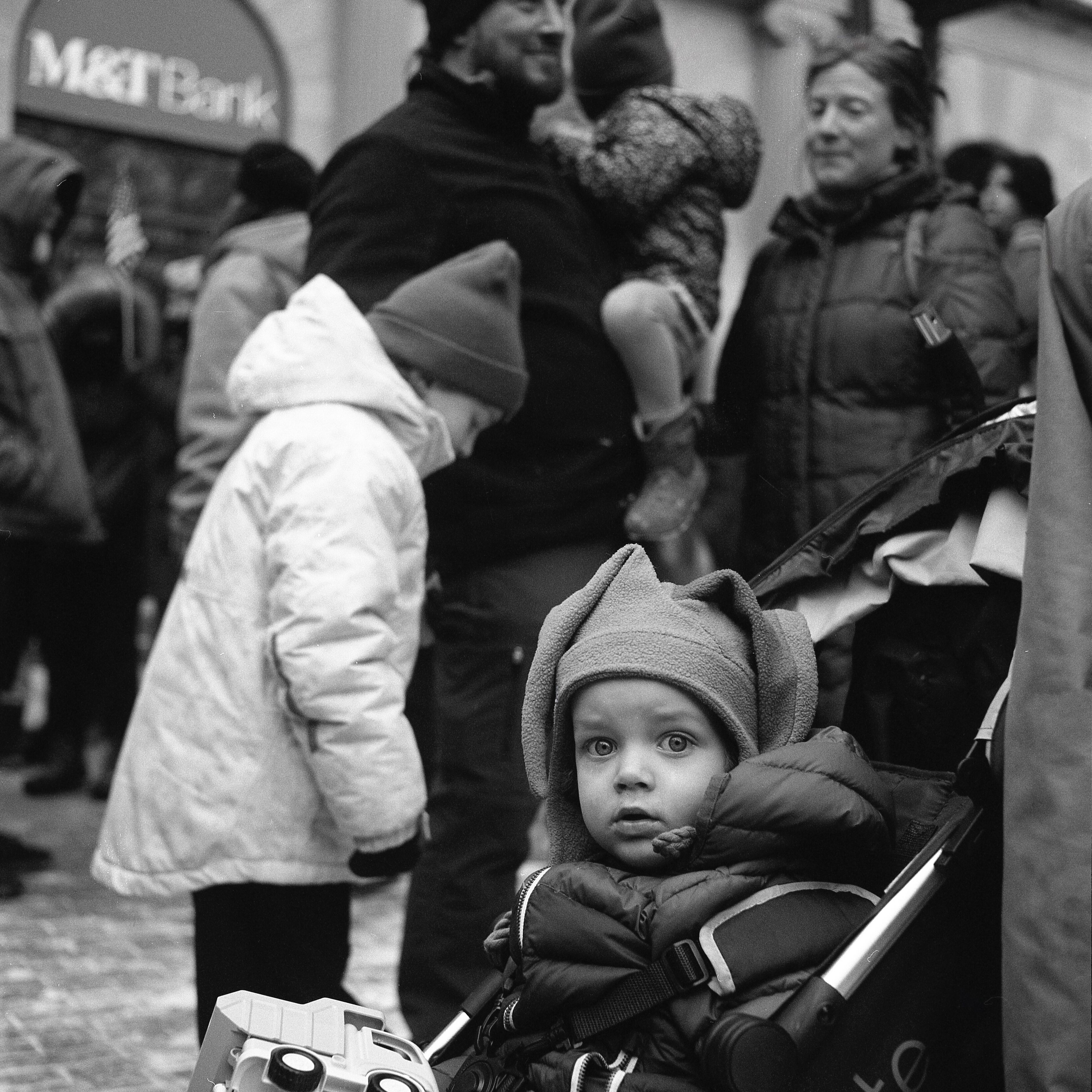Foreword by Founding Editor Henry Fernandez
For Billy Stammer, photos are portals that give keen insight into who we are, and who we (perhaps always) have been. I’ve known Stammer for only a brief while, yet as a person and a burgeoning photojournalist – if you can believe it, this is his first ever piece of photojournalism – he is inspired by the past.
In this essay, Stammer blends the politics of today with the protest photojournalism of yesteryear. He tells the story of modern day Ithacans fighting for the undocumented immigrants who live alongside them, yet his shots also allude to the everpresent spectre of Civil Rights activism in the sixties that is the scaffolding for contemporary activism. His shots, on a technical and aesthetic level, could fit alongside the photographs of titans like Steve Starr and Jill Freedman.

I went to an anti-deportation protest on February 2nd. Old women in sunglasses, masked-up millennials, Christians, hippies with white beards, kids who were dragged along with their progressive parents—they all showed up and tossed their support into a pile in the center of the Ithaca Commons. The crowd formed a loose circle which stretched across the cobblestone streets where protesters had to shout from the way back to make their voices heard. The chants sounded delayed, with one side echoing the other, always a beat behind, from many yards away.
I arrived with my grandma’s 1954 Rolleiflex, a camera I found in her basement about a month ago. In its lifetime, it’s been on trips to India, Greece, Afghanistan, all from an era when a roll of film cost $1.15. The Rolleiflex beckons me toward the pretty things—wonder, laughter, jubilation—faces which look the same regardless across time. And so I hold my camera tight when I’m shooting because it would cost a fortune to replace—and because it tells the truth.
It’s the only one I know who tells the truth.

Only a few weeks into Trump’s second term, ICE agents detained Jesus Romero-Hernandez, an undocumented immigrant living in Ithaca who had pled guilty to and served time for 3rd-degree assault charges. He had served his full sentence, but was arrested by ICE after his release from jail.
Local law enforcement refused to cooperate with the ICE investigation due to Ithaca’s status as a sanctuary city.


Hosted by Reverend Kirianne E. Weaver of The First Presbyterian Church of Ithaca, the rally naturally alluded to faith-based brotherhood and solidarity. I’m not a Christian, but I felt the love.






I look through the viewfinder to see who people are in split-second glances—their mood, their confidence, their comfort levels. Not everybody likes being seen. Sometimes people smile and laugh after I catch them candid. Some will confront me and start yelling profanities. It’s a losing game between politeness and candor. And maybe it was my outfit or my funny-looking camera, but people seemed unusually comfortable being in my photos during the protest.
Some even approached me, like an older woman in the back of the crowd who waved me down smiling and asked if I could pose with my camera. I obliged, and she sent the picture of me to her son. Another was surprised that anyone would still shoot on film anymore. Though not all of the older attendees knew the name of my camera, I’m sure many recognized it as a relic from their childhood.



I followed the crowd across town to the First Presbyterian Church where Rev. Weaver featured guest speakers, including Ithaca 1st Ward Alderperson Kayla Matos. During her brief address, Matos lauded Tompkins County Sheriff Derek Osborne’s decision to release Mr. Romero-Hernandez.
After Matos finished speaking, I walked out past the pews with my Rolleiflex in hand—church door closed, holding tight, into the piercingly cold Ithaca wind.

Film doesn’t age, struggles stay the same, movements are ever-changing. The metal frame of the camera was still cold when I reached my dorm; sweat marks stained the near-century old leather.
Shooting on film compels you to stop and feel the moment before you compose a shot, to look the subject in the eye for a little longer than when shooting digitally, with a little more sincerity and trust, a bit more compassion and intimacy, a sign of respect and dignity.
These photos, they’re gifts. I didn’t take them, they were offered to me by the people of Ithaca. They let me in, they welcomed me, they told me their life stories and what they were fighting for. Everyday people defending their community. ⬥
